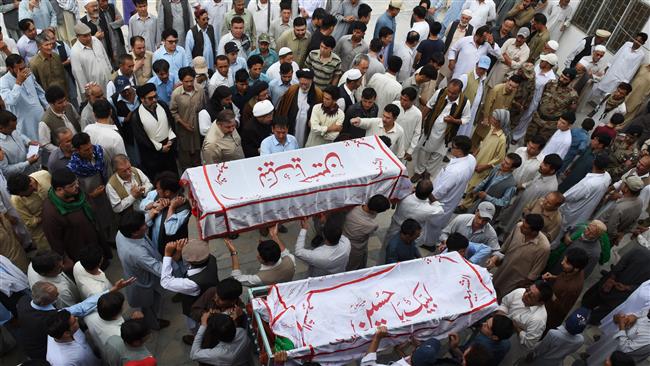
RNA - Local police chief Mohammad Ishaq said on Wednesday that the drive-by shooting took place in Mastung district of Balochistan province.
The casualties were caused after gunmen sprayed bullets at the vehicle of the Hazara Shia family travelling to the southern port city of Karachi as they passed through Choto, a town about 40 kilometers (25 miles) south of the Balochistan provincial capital, Quetta.
Provincial Home Minister Sarfraz Bugti confirmed that three men and a woman from the Shia Hazara community were killed in the assault.
Ghazanfar Ali, the police chief in Mastung, said, "The Shi'ites [Shia Muslims] were targeted because of their faith."
The attack came days after 75 Shia Muslims were killed and more than 300 injured in two subsequent blasts that rocked a densely populated area of the northwestern Pakistani town of Parachinar. The blasts took place three minutes from each other on June 23.
The incident sparked protest for several days across the violence-hit region.
Quetta, the largest city of Balochistan, has seen several bombings and shooting attacks over the past years. A large number of Shia Muslims have been killed in the attacks there.
Two militant attacks against the Shia Hazara community in Quetta killed nearly 200 people in early 2013.
No group immediately claimed responsibility for the latest deadly attack but outlawed extremist groups have claimed similar attacks on Shia Muslims in the past.
A notorious terrorist group known as Lashkar-e-Jhangvi (LeJ) has also been involved in several attacks on Shia Muslims in recent years.
In recent months, the Daesh Takfiri terrorist group, which is wreaking havoc mainly in Iraq and Syria, has been making inroads in Pakistan through alliances with local militant outfits such as LeJ and the Jamaat-ul-Ahrar, a breakaway faction of the Pakistani Taliban.
Data from the South Asia Terrorism Portal shows more than 2,600 Shia Muslims have been killed in militant attacks since 2002 across Pakistan. Shia advocacy groups, however, say the figures could be much higher.
It is believed that since the early 1990s until 2012, over 4,000 Pakistani Shias had been murdered in attacks, and at a pace which has rapidly accelerated in recent years.
Shias make up about one third of Pakistan's population of nearly 200 million.
Critics blame the Pakistani government and some elements within intelligence services for unwillingness to protect Shia Muslims and moderate Sunnis across the violence-wracked country.
International organizations and rights groups have urged the Pakistani government to take decisive action against the forces involved in the targeted killings.
Security has been a main issue for Shias since thousands of them have been killed as a result of militancy and hate attacks over the past decade.
847/940